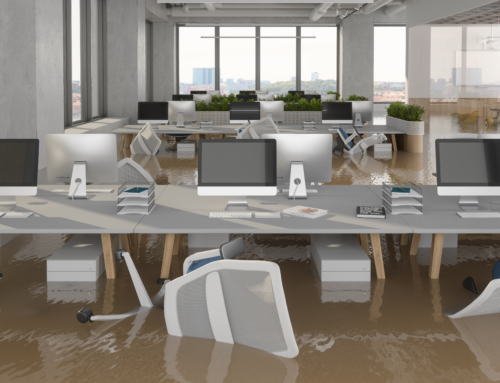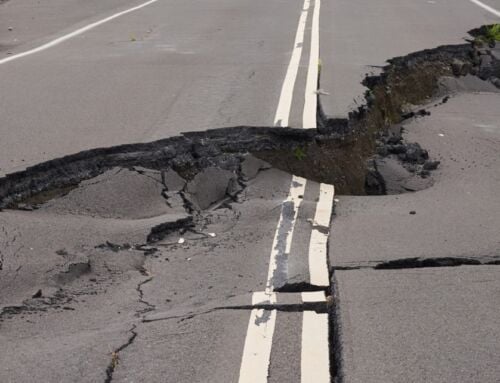Business interruption insurance offers companies an added layer of protection if they have to cease operations unexpectedly.
For example, imagine your retail business floods in a severe storm that damages your equipment and destroys your inventory. Your company is forced to relocate to a site a few hours away, and you must pay premium prices to get supplies and equipment delivered to the new site overnight. Meanwhile, you fall behind on deliveries, and some of your regular customers switch to other vendors.
Scenarios like this are not uncommon. While property insurance would cover some of the costs your company could incur, other expenses would only be covered by business interruption insurance. Read more to discover how business interruption insurance could help your company weather the storm.
What is business interruption insurance?
Business interruption insurance can help cover lost income and ongoing operating expenses when a business is unable to run at full capacity due to a covered event. A business owner can use the insurance to replace revenues they missed out on while their business was closed and to pay for many of the extra expenses incurred because of the disruption.
Is business interruption insurance different from property insurance?
Business interruption insurance and business property insurance are related but distinctly different. In the example mentioned above, property insurance would pay for the damaged equipment and inventory, as well as water damage repairs to the building and mould remediation.
Business interruption insurance would cover the income that the company had lost, as well as additional expenses incurred, such as relocation costs, rent at the new location, and employee housing costs. Together with property insurance, business interruption insurance could help the business recover from the event.
What does business interruption insurance cover?
Business interruption insurance policies vary by provider and by plan, but typically cover expenses such as:
- Operating expenses that continue even if the business is temporarily closed, including utilities, taxes, insurance payments, loan payments, and lease payments
- Temporary relocation costs, including rent and moving expenses
- Salaries and wages, which can help employees with their financial obligations and help the business retain key personnel
- Hiring and training costs for new or temporary employees
- Damage to adjacent properties not owned by the business
What can trigger a business interruption insurance claim?
A business interruption insurance claim can be triggered by a covered loss that causes the business to close or scale back due to events beyond its control. Here are some common reasons for making claims:
- Natural disasters such as hurricanes, earthquakes, floods, wildfires, tornadoes, and severe storms
- Fires or explosions
- Theft
- Technology-related problems, including cyber-attacks
- Equipment failures
- Utility interruptions, such as power failures
- Supply chain interruptions
- Evacuation orders
- Public health emergencies
- Loss of key personnel due to death or injury, leading to the need to hire new staff
Which businesses need business interruption insurance?
All businesses can benefit from business interruption insurance, but it is particularly important for companies with these characteristics:
- Heavy dependence on foot traffic
Retail stores, shopping malls, bakeries, coffee shops, movie theatres, and tourist attractions are examples of businesses that could lose a great deal of income if their sites were inaccessible.
- Thin profit margins
Businesses with narrow profit margins, such as restaurants, grocery stores, gas stations, and discount retailers are at greater risk because they have limited financial reserves.
- Continuous production processes
Companies that rely on continuous production, such as auto factories, oil refineries, pharmaceutical producers, and breweries, can suffer significant losses during an interruption in their operations because they are heavily dependent on supply chains, transportation infrastructure, equipment, and machinery.
- Exclusively online operations
Businesses that operate primarily or entirely online are dependent on access to technology and the Internet. They are particularly vulnerable to business interruptions stemming from cyber-attacks, data breaches, and equipment failures.
- Franchise agreements
Franchises often have contractual obligations, and fees continue even if the business is temporarily closed.
- High-risk location
Businesses operating in areas at high risk for natural disasters, such as near fault lines, in coastal areas, or on flood plains, could be disproportionately impacted by these events.
- Specialized staff
Staff with highly specialized skills may go elsewhere if the business has to close for a while. Business interruption insurance can pay their salaries and wages during the interruption, ensuring that they will be available when the business reopens.
Keep your business safe with business interruption insurance
Unfortunately, you can’t always control what happens to your business. You can, however, control how prepared you are. Having the right protection in place can make a huge difference. To learn more, visit our business interruption insurance page today.
This blog is provided for information only and is not a substitute for professional advice. We make no representations or warranties regarding the accuracy or completeness of the information and will not be responsible for any loss arising out of reliance on the information.






